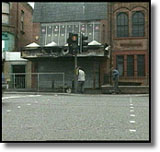
|
Leaked Document Proves Government Never Considered Banning Drumcree MarchA leaked Government document obtained by the BBC shows the Northern Ireland Office never considered banning or re-routing the Drumcree march. The document, written by a senior civil servant, said that obtaining a local agreement was preferable, but if that did not materialise then the controlled march down Garvaghy Road was the "least worst option". The document was dated June 20th, a week before negotiations -- the so-called Proximity Talks -- to find a compromise took place. In the event, no agreement was reached, and the march went ahead. Nationalists, angered by what they saw as the Government's refusal to uphold their rights, took to the streets for the second night running. There were violent clashes with security forces, and vehicles and buildings were set ablaze. The leaked document will almost certainly further inflame nationalist feelings. Alex Attwood of the mainly nationalist SDLP said: "I think this raises further questions for the Secretary of State to account for. She has to account much more fully for why the police did what they did, she has to account for why the political decision was made as it was made, and she must acount for this particular briefing and memo. It raises much more fundamental questions -- not just about the Secretary of State and the police -- but about whether the Proximity Talks, and everything that's happened before or since, was just theatre." Blair Searching for PeaceThe Prime Minister, Tony Blair, earlier said he would go on searching for peace in Northern Ireland despite the disorder following the Orange Order march in Portadown on Sunday.The Northern Ireland Secretary, Mo Mowlam, also appealed to both communities to show a willingness to resolve disputes. Mr Blair aid he was sure that the vast majority of people in Ulster wanted peace.
Ms Mowlam, at an impromptu news conference, said she understood the anger in the nationalist community, but nothing could excuse the orchestrated violence that had been seen. The Secretary of State said she would be having a series of meetings to discuss what had happened. She would be telling leaders of the Orange Order that it was time for them to look back and see that if there had been some accommodation then the weekend's events could have been avoided. She said: "It is a time for generosity on their part."
The Irish Prime Minister, Bertie Ahern, condemned the violence. He said there had been contact "on a number of fronts" with the British Government - including a 10-minute telephone conversation with Tony Blair which Downing Street characterised as "positive" and "constructive".
Mr Ahern's Fianna Fail party's parliamentary chairman, Rory O'Hanlon, provided him with a firsthand report on events surrounding the Orange parade in Portadown. Sinn Fein's chairman, Mitchel McLaughlin, said the Government's decisions were apparently being driven by loyalist threats. As a result, it was allowing Orangemen to stage "triumphalist" parades through nationalist areas rather than in their own communities. The idea that this was necessary to avoid trouble was often stated but had never been tested, he said. It was time to stand up to the "loyalist bully boys". Mr McLaughlin said that fewer than two dozen of more than 3,000 marches were controversial because the organisers insisted on marching through nationalist areas. The Sinn Fein President, Gerry Adams, appealed for calm. But he laid the blame for the violence squarely at the Government's door.
|
Diana, Princess of Wales, 1961-1997
Conference 97
Devolution
The Archive
News |
Issues |
Background |
Parties |
Analysis |
TV/Radio/Web
Interactive |
Forum |
Live |
About This Site
News |
Issues |
Background |
Parties |
Analysis |
TV/Radio/Web
Interactive |
Forum |
Live |
About This Site
© BBC 1997 |
politics97@bbc.co.uk |


